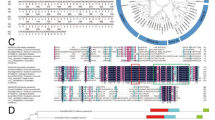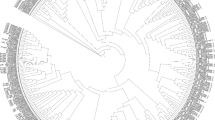Abstract
Prunus mume, a woody perennial tree, is valued for its ornamental traits and has been cultivated for a long history. Low temperature is the main environmental factor restricting the distribution and affecting the growth of P. mume. In plants, some WRKY transcription factors have been reported to participate in regulating cold tolerance. However, there were few researches about functional characterization of WRKYs involving in P. mume cold response. Here, a cold-induced WRKY gene named as PmWRKY57 was cloned from a P. mume cultivar ‘Guhong Zhusha.’ PmWRKY57 protein harboring a WRKY domain and a C2H2 zinc finger motif belongs to Group IIc of WRKY family. The PmWRKY57 protein was located to the nucleus and has transcriptional activation activity. PmWRKY57-overexpresing Arabidopsis thaliana lines showed improved cold tolerance, compared to wild-type plants. Under cold treatment, the leaves of transgenic lines contained significantly lower malondialdehyde content, and higher levels of superoxide dismutase activity, peroxidase activity, and proline content than wild-type plants. Furthermore, the expression levels of cold-response genes such as AtCOR6.6, AtCOR47, AtKIN1, and AtRCI2A were up-regulated in leaves of transgenic A. thaliana compared to those in wild-type plants. This study characterized the function of PmWRKY57 in improving cold tolerance of plants.







Similar content being viewed by others
Data Availability
All data generated or analysed during this study are included in this published article and its supplementary file.
References
Bao, F., Ding, A., Cheng, T., Wang, J., & Zhang, Q. (2019). Genome-wide analysis of members of the WRKY gene family and their cold stress response in Prunus mume. Genes, 10, 911.
Miura, K., & Furumoto, T. (2013). Cold signaling and cold response in plants. International Journal of Molecular Sciences, 2013, 5312–5337.
Ritonga, F. N., & Chen, S. (2020). Physiological and molecular mechanism involved in cold stress tolerance in plants. Plants, 9, 560.
Megha, S., Basu, U., & Kav, N. N. V. (2018). Regulation of low temperature stress in plants by microRNAs. Plant, Cell and Environment, 41, 1–15.
Cook, D., Fowler, S., Fiehn, O., & Thomashow, M. F. (2004). A prominent role for the CBF cold response pathway in configuring the low-temperature metabolome of Arabidopsis. Proceedings of the National Academy of Sciences of the USA, 101, 15243–15248.
Chinnusamy, V., Ohta, M., Kanrar, S., Lee, B.-H., Hong, X., Agarwal, M., & Zhu, J.-K. (2003). ICE1: A regulator of cold-induced transcriptome and freezing tolerance in Arabidopsis. Genes & Development, 17, 1043–1054.
Yao, P., Sun, Z., Li, C., Zhao, X., Li, M., Deng, R., Huang, Y., Zhao, H., Chen, H., & Wu, Q. (2018). Overexpression of Fagopyrum tataricum FtbHLH2 enhances tolerance to cold stress in transgenic Arabidopsis. Plant Physiology and Biochemistry, 125, 85–94.
Sun, X., Zhu, Z., Zhang, L., Fang, L., Zhang, J., Wang, Q., Li, S., Liang, Z., & Xin, H. (2019). Overexpression of ethylene response factors VaERF080 and VaERF087 from Vitis amurensis enhances cold tolerance in Arabidopsis. Scientia Horticulturae, 243, 320–326.
Wang, Y., Mao, Z., Jiang, H., Zhang, Z., & Chen, X. (2019). A feedback loop involving MdMYB108L and MdHY5 controls apple cold tolerance. Biochemical and Biophysical Research Communications, 512, 381–386.
Chen, L., Zhao, Y., Xu, S., Zhang, Z., Xu, Y., Zhang, J., & Chong, K. (2018). OsMADS57 together with OsTB1 coordinates transcription of its target OsWRKY94 and D14 to switch its organogenesis to defense for cold adaptation in rice. New Phytologist, 218, 219–231.
Rushton, P. J., Somssich, I. E., Ringler, P., & Shen, Q. J. (2010). WRKY transcription factors. Trends in Plant Science, 5, 247–258.
Eulgem, T., Rushton, P. J., Robatzek, S., & Somssich, I. E. (2000). The WRKY superfamily of plant transcription factors. Trends in Plant Science, 5, 199–206.
Marè, C., Mazzucotelli, E., Crosatti, C., Francia, E., Stanca, A. M., & Cattivelli, L. (2004). Hv-WRKY38: A new transcription factor involved in cold- and drought-response in barley. Plant Molecular Biology, 55, 399–416.
Zhou, Q. Y., Tian, A. G., Zou, H. F., Xie, Z. M., Lei, G., Huang, J., Wang, C. M., Wang, H. W., Zhang, J. S., & Chen, S. Y. (2008). Soybean WRKY-type transcription factor genes, GmWRKY13, GmWRKY21, and GmWRKY54, confer differential tolerance to abiotic stresses in transgenic Arabidopsis plants. Plant Biotechnology Journal, 6, 486–503.
Li, H., Xu, Y., Xiao, Y., Zhu, Z., Xie, X., Zhao, H., & Wang, Y. (2010). Expression and functional analysis of two genes encoding transcription factors, VpWRKY1 and VpWRKY2, isolated from Chinese wild Vitis pseudoreticulata. Planta, 232, 1325–1337.
Niu, C. F., Wei, W., Zhou, Q. Y., Tian, A. G., Hao, Y. J., Zhang, W. K., Ma, B., Lin, Q., Zhang, Z. B., Zhang, J. S., & Chen, S. Y. (2012). Wheat WRKY genes TaWRKY2 and TaWRKY19 regulate abiotic stress tolerance in transgenic Arabidopsis plants. Plant Cell & Environment, 35, 1156–1170.
Kim, C. Y., Vo, K. T. X., Nguyen, C. D., Jeong, D. H., Lee, S. K., Kumar, M., Kim, S. R., Park, S. H., Kim, J. K., & Jeon, J. S. (2016). Functional analysis of a cold-responsive rice WRKY gene, OsWRKY71. Plant Biotechnology Reports, 10, 13–23.
Zhang, L., Zhao, T., Sun, X., Wang, Y., Du, C., Zhu, Z., Gichuki, D. K., Wang, Q., Li, S., & Xin, H. (2019). Overexpression of VaWRKY12, a transcription factor from Vitis amurensis with increased nuclear localization under low temperature, enhances cold tolerance of plants. Plant Molecular Biology, 100, 95–110.
Wang, M. Q., Huang, Q. X., Lin, P., Zeng, Q. H., Li, Y., Liu, Q. L., Zhang, L., Pan, Y. Z., Jiang, B. B., & Zhang, F. (2020). The overexpression of a transcription factor gene VbWRKY32 enhances the cold tolerance in Verbena bonariensis. Frontiers in Plant Science, 10, 1746.
Huang, X., Cao, L., Fan, J., Ma, G., & Chen, L. (2022). CdWRKY2-mediated sucrose biosynthesis and CBF-signalling pathways coordinately contribute to cold tolerance in bermudagrass. Plant Biotechnology Journal, 20, 660–675.
Zhang, Q., Chen, W., Sun, L., Zhao, F., Huang, B., Yang, W., Tao, Y., Wang, J., Yuan, Z., Fan, G., Xing, Z., Han, C., Pan, H., Zhong, X., Shi, W., Liang, X., Du, D., Sun, F., Xu, Z., … Wang, J. (2012). The genome of Prunus mume. Nature Communications, 3, 1318.
Zhu, S., Fang, Q., Wang, Y., Zhong, S., Dong, B., & Zhao, H. (2022). OfSPL11 gene from Osmanthus fragrans promotes plant growth and oxidative damage reduction to enhance salt tolerance in Arabidopsis. Horticulturae, 8, 412.
Clough, S. J., & Bent, A. F. (1998). Floral dip: A simplified method for Agrobacterium-mediated transformation of Arabidopsis thaliana. The Plant Journal, 16, 735–743.
Gao, S., Yuan, L., Zhai, H., Liu, C., He, S., & Liu, Q. (2011). Transgenic sweetpotato plants expressing an LOS5 gene are tolerant to salt stress. Plant Cell, Tissue and Organ Culture, 107, 205–213.
Wang, Y., Zhang, C., Dong, B., Fu, J., Hu, S., & Zhao, H. (2018). Carotenoid accumulation and its contribution to flower coloration of Osmanthus fragrans. Frontiers in Plant Science, 9, 1499.
Livak, K. J., & Schmittgen, T. D. (2001). Analysis of relative gene expression data using real-time quantitative PCR and the 2−ΔΔCT method. Methods, 25, 402–408.
Peng, T., Guo, C., Yang, J., Xu, M., Zuo, J., Bao, M., & Zhang, J. (2016). Overexpression of a Mei (Prunus mume) CBF gene confers tolerance to freezing and oxidative stress in Arabidopsis. Plant Cell, Tissue and Organ Culture, 126, 373–385.
Bao, F., Du, D., An, Y., Yang, W., Wang, J., Cheng, T., & Zhang, Q. (2017). Overexpression of Prunus mume dehydrin genes in tobacco enhances tolerance to cold and drought. Frontiers in Plant Science, 8, 151.
Zhao, K., Zhou, Y., Li, Y., Zhuo, X., Ahmad, S., Han, Y., Yong, X., & Zhang, Q. (2018). Crosstalk of PmCBFs and PmDAMs based on the changes of phytohormones under seasonal cold stress in the stem of Prunus mume. International Journal of Molecular Sciences, 19, 15.
Zhuo, X., Zheng, T., Zhang, Z., Zhang, Y., Jiang, L., Ahmad, S., Sun, L., Wang, J., Cheng, T., & Zhang, Q. (2018). Genome-wide analysis of the NAC transcription factor gene family reveals differential expression patterns and cold-stress responses in the woody plant Prunus mume. Genes, 9, 494.
Hoekstra, F. A., Golovina, E. A., & Buitink, J. (2001). Mechanisms of plant desiccation tolerance. Trends in Plant Science, 6, 431–438.
Acknowledgements
This research was financially supported grants from National Key R&D Program of China (No. 2018YFD1000400; 2019YFD1001500) and the key research and development program of Zhejiang Province (2021C02071).
Author information
Authors and Affiliations
Corresponding author
Ethics declarations
Conflict of interest
The authors declare that they have no conflict of interest.
Additional information
Publisher's Note
Springer Nature remains neutral with regard to jurisdictional claims in published maps and institutional affiliations.
Supplementary Information
Below is the link to the electronic supplementary material.
Rights and permissions
Springer Nature or its licensor (e.g. a society or other partner) holds exclusive rights to this article under a publishing agreement with the author(s) or other rightsholder(s); author self-archiving of the accepted manuscript version of this article is solely governed by the terms of such publishing agreement and applicable law.
About this article
Cite this article
Wang, Y., Dong, B., Wang, N. et al. A WRKY Transcription Factor PmWRKY57 from Prunus mume Improves Cold Tolerance in Arabidopsis thaliana. Mol Biotechnol 65, 1359–1368 (2023). https://doi.org/10.1007/s12033-022-00645-3
Received:
Accepted:
Published:
Issue Date:
DOI: https://doi.org/10.1007/s12033-022-00645-3




